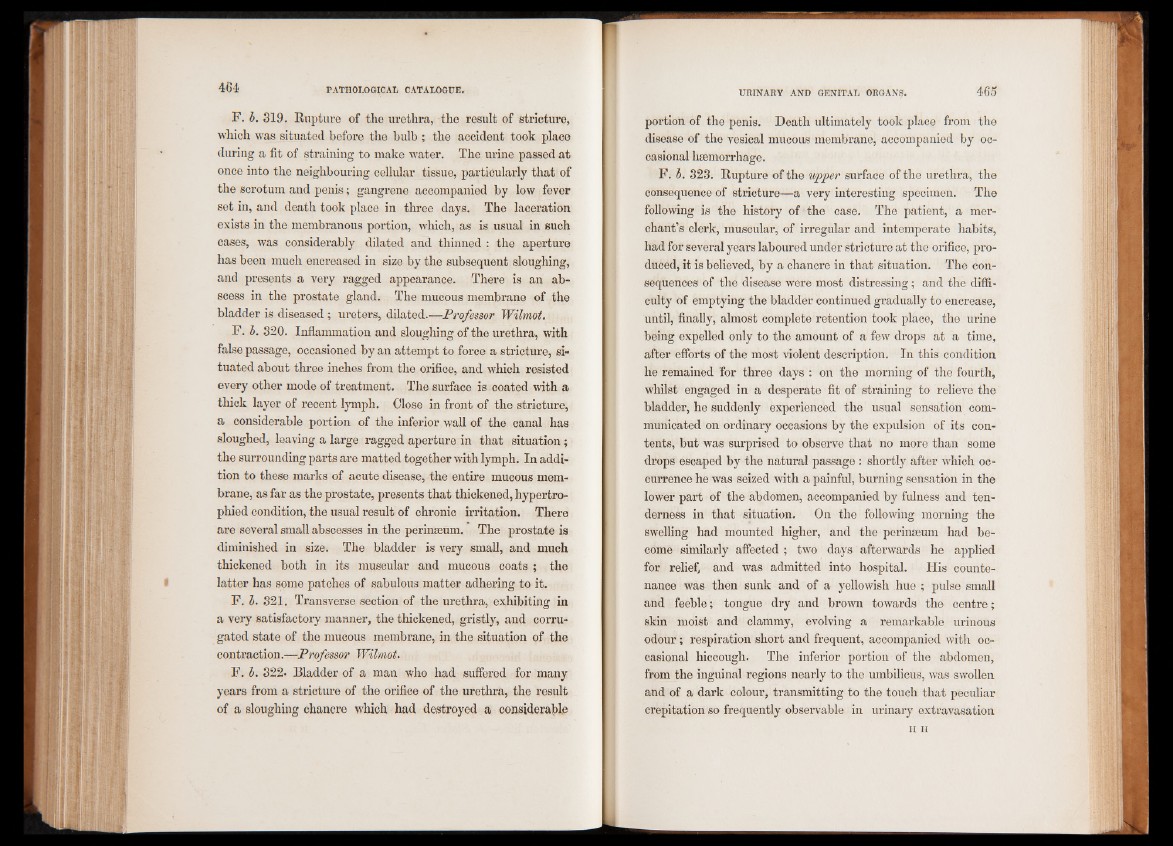
F. b. 319. Rupture of the urethra, the result of stricture,
which was situated before the bulb ; the accident took place
during a fit of straining to make water. The urine passed at
once into the neighbouring cellular tissue, particularly that of
the scrotum and penis; gangrene accompanied by low fever
set in, and death took place in three days. The laceration
exists in the membranous portion, which, as is usual in such
cases, was considerably dilated and thinned : the aperture
has been much encreased in size by the subsequent sloughing,
and presents a very ragged appearance. There is an abscess
in the prostate gland. The mucous membrane of the
bladder is diseased; ureters, dilated.—Professor Wilmot.
F. b. 320. Inflammation and sloughing of the urethra, with
false passage, occasioned by an attempt to force a stricture, situated
about three inches from the orifice, and which resisted
every other mode of treatment. The surface is coated with a
thick layer of recent lymph. Close in front of the stricture,
a considerable portion of the inferior wall of the canal has
sloughed, leaving a large ragged aperture in that situation;
the surrounding parts are matted together with lymph. In addition
to these marks of acute disease, the entire mucous membrane,
as far as the prostate, presents that thickened, hypertrophied
condition, the usual result of chronic irritation. There
are several small abscesses in the perinseum. The prostate is
diminished in size. The bladder is very small, and much
thickened both in its muscular and mucous coats ; the
latter has some patches of sabulous matter adhering to it.
F. b. 321. Transverse section of the urethra, exhibiting in
a very satisfactory manner, the thickened, gristly, and corrugated
state of the mucous membrane, in the situation of the
contraction.—Professor Wilmot.
F. b. 322. Bladder of a man who had suffered for many
years from a stricture of the orifice of the urethra, the result
of a sloughing chancre which had destroyed a considerable
portion of the penis. Death ultimately took place from the
disease of the vesical mucous membrane, accompanied by occasional
haemorrhage.
F. b. 323. Rupture of the wpper surface of the urethra, the
consequence of stricture—a very interesting specimen. The
following is the history of the case. The patient, a merchant’s
clerk, muscular, of irregular and intemperate habits,
had for several years laboured under stricture at the orifice, produced,
it is believed, by a chancre in that situation. The consequences
of the disease were most distressing; and the difficulty
of emptying the bladder continued gradually to encrease,
until, finally, almost complete retention took place, the urine
being expelled only to the amount of a few drops at a time,
after efforts of the most violent description. In this condition
he remained ‘for three days : on the morning of the fourth,
whilst engaged in a desperate fit of straining to relieve the
bladder, he suddenly experienced the usual sensation communicated
on ordinary occasions by the expulsion of its contents,
but was surprised to observe that no more than some
drops escaped by the natural passage : shortly after which occurrence
he was seized with a painful, burning sensation in the
lower part of the abdomen, accompanied by fulness and tenderness
in that situation. On the following morning the
swelling had mounted higher, and the perinseum had become
similarly affected ; two days afterwards he applied
for relief, and was admitted into hospital. His countenance
was then sunk and of a yellowish Rue ; pulse small
and feeble; tongue dry and brown towards the centre;
skin moist and clammy, evolving a remarkable urinous
odour; respiration short and frequent, accompanied with occasional
hiccough. The inferior portion of the abdomen,
from the inguinal regions nearly to the umbilicus, was swollen
and of a dark colour, transmitting to the touch that peculiar
crepitation so frequently observable in urinary extravasation